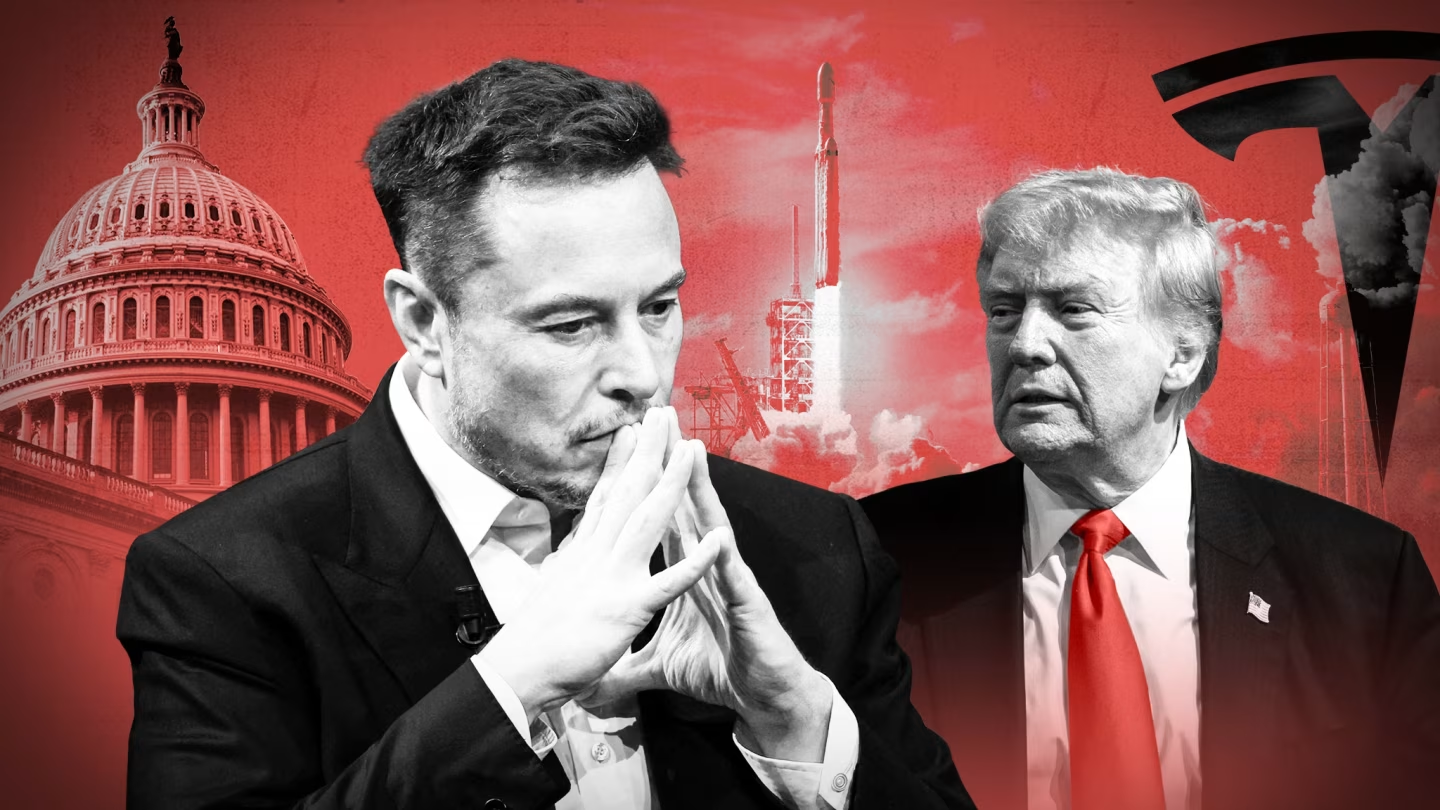



Each time, personal pride trumped institutional stability.
History has seen this before—not in boardroom charts or policy papers, but in the drama of human ego that steamrolled over collective good. Edison vs. Tesla delayed the electric future. Sculley vs. Jobs nearly buried Apple. Hughes fought Pan Am and lost an empire in the haze of obsession. Rockefeller’s standoff with Roosevelt shook the foundations of monopoly capitalism.
And now, in 2025, the world watched yet another chapter: Trump vs. Musk—an ego clash that didn’t just bruise reputations. It sent shivers through financial markets, confused regulators, and made the most powerful economy in the world feel like a gladiator ring with no rules.
Trump–Musk: Gloves Off, Markets Down
It began with sharp words and sharper tweets. Elon Musk, never shy of a platform, blasted Trump’s budget plan as “a disgusting abomination.” He brought Epstein into the mix. He threw barbs about ethics, spending, and political posturing. Trump, in true form, hit back from Truth Social, calling Musk “a double-dealing tech tyrant” and threatening to yank every federal contract from SpaceX, Tesla, Neuralink—name a Musk venture, it was on the line.
And just like that, $152 billion of Tesla’s market value evaporated in a day. Wall Street gasped. Global investors scrambled for exits. Indexes dipped, then tumbled. It wasn’t just stock—it was trust that took the real hit.
Because when two men who command satellites, currencies, influence, and mobs turn a difference of opinion into a proxy war for power, something far greater than valuation is at stake.
Strangely, what followed was silence.
The American public, fed for years on soundbites and partisanship, treated it like another season of “House of Billionaires.” TV channels reported, hashtags trended, but the collective pulse stayed eerily calm. There were no Senate statements, no sharp op-eds, no moral outrage. Only the dull hum of disbelief and helplessness.
The moral centre had vanished—not in argument, but in absence.
The institutions—meant to regulate, balance, and intervene—stood still. The SEC murmured about reviewing “impactful tweets.” The White House said “we’re monitoring the situation.” That’s it.
Even the Mediators Flinched
Behind closed doors, a few tried to step in. Bill Ackman made a call. J.D. Vance looped in a senior SpaceX executive. Aides from both camps arranged a “quiet conversation.”
But no one wanted to be seen choosing sides. In this standoff, even mediators were afraid of being mistaken for men with opinions.
Because when egos this big collide, neutrality is not safety—it’s survival.
And that’s the true tragedy of the moment. Not just the loss of money or market momentum. But the shrinking of America’s confidence in itself—where leadership is a stage for performance, not principle.
It’s tempting to treat the Trump–Musk fallout as an episode. But that would be a mistake. What we witnessed was a lesson—in how unchecked influence, when left to personal temperament, can erode the scaffolding of institutions.
And what happens when this becomes the norm?
When policy is weaponised against criticism?
When wealth is used not to build, but to dominate?
We saw it in Hughes. We saw it in Jobs’s ousting. We saw it in Tesla’s nosedive. And now we’ve seen it in Trump vs. Musk.
Ego doesn’t build. It conquers, it consumes, and then it collapses.
A Truce or Just a Pause?
Yes, there was a call. Yes, apologies were exchanged. Musk deleted his most viral jabs. Trump said “no hard feelings” on a podcast. Stocks recovered a bit. The storm passed.
But the aftertaste remains.
Not because two men fought—but because no one else stood up while they did. And that silence may cost more than any single day’s market loss.
Final Line
A democracy can survive disagreement. But when power becomes performance—and ego the only ideology—the institutions don’t just bend. They break.